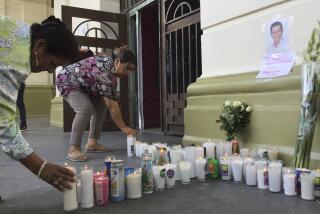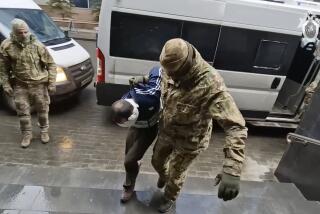Russian Leader of Troubled Region Slain : Caucasus: Gunmen ambush administrator in conflict-racked North Ossetia.
- Share via
MOSCOW — Gunmen on horseback ambushed and killed a special envoy sent by President Boris N. Yeltsin to administer a conflict-racked zone in the Russian Caucasus, Moscow authorities announced Monday.
The unknown assassins hid behind bushes and shot Viktor P. Polyanichko at close range as his motorcade drove through a forest Sunday afternoon near the village of Tarskoye in North Ossetia. They then galloped away.
Killed with him were Russian army Maj. Gen. Anatoly G. Koretsky, commander of the garrison in the North Ossetian capital of Vladikavkaz, and a senior lieutenant. Three bodyguards were also wounded, authorities said.
Yeltsin’s chief nationalities adviser, Vice Prime Minister Sergei M. Shakhrai, and Defense Minister Pavel S. Grachev rushed to Vladikavkaz. At the airport, journalists asked Shakhrai whether the assassins were Ingush or Ossetian.
“Bandits have no nationality,” he replied.
The murders came a day after Russia’s Parliament had approved a Yeltsin order extending the state of emergency in the troubled areas of Ingushetia and North Ossetia, where at least 300 people were killed in ethnic clashes in October and at least 49,000 Ingush were forced to flee North Ossetia.
The attack sent shock waves through Moscow, where it was seen as a sign that Russia’s political center of gravity is losing its pull in the provinces. By czarist and Soviet tradition, senior officials touring remote fiefdoms are not supposed to be subjected to insolence, let alone violence.
“Moscow has gradually begun to lose its ground in the Caucasus,” said Mikhail V. Tavkhelidze of the Foreign Ministry’s Center for Ethnic Political Research.
The attack could scuttle a fragile new accord aimed at allowing Ingush refugees to return to their homes in North Ossetia. Refugees were to have begun arriving in four designated villages Monday to begin the delicate resettlement process.
Polyanichko, 54, a Russian vice prime minister, was appointed just 35 days ago as head of the provisional administration in the emergency zone.
A controversial figure who had survived three previous attempts on his life, Polyanichko’s tactics as a Soviet official in Afghanistan and Azerbaijan prompted one political opponent to call him “The Butcher,” the Moscow News reported.
But others saw him as the kind of tough politician who could inspire the necessary respect and fear in a region where war has been a way of life for a millennium.
The Ingush-Ossetian conflict has its roots in the poisonous ethnic policies of Soviet dictator Josef Stalin.
Stalin suspected the Ingush of disloyalty and in 1942 deported the entire population to Soviet Central Asia. Thousands died, and when they were at last allowed to return in 1957, they found Ossetians living in their ancestral homes.
Some of their territory was never returned and is still part of North Ossetia. This includes the region of Prigorodny, where Polyanichko was ambushed. About 60% of the population there is Ingush. Unexplained explosions, shootings and an attack on Russian army troops have rocked the area recently.
The president of the Ingush Republic, Ruslan Aushev, called Sunday’s ambush a “paid assassination” ordered by forces who wish “to prevent the return of Ingush refugees to their homes in North Ossetian territory.” Ossetia’s president also denounced the murders and promised Yeltsin to help find the killers.
In fact, scholars said, both sides had motives for the murder, and neither government can control its well-armed partisans.
During the clashes in October, the Russian army clearly sided with Ossetians against the Ingush, said Sergei A. Arutiunov, chairman of Caucasian studies at the Moscow Institute of Ethnology and Anthropology.
“Maybe Polyanichko was killed by Ingush who believe he’s a Russian with a pro-Ossetian bias, or maybe by an Ossetian, since he advocated some limited return of Ingush (refugees),” Arutiunov said.
Arutiunov said that the prospect of privatization of land in Russia has raised the stakes for ethnically based territorial disputes, especially in the Caucasus, a densely populated area where the scant arable land has been fought over for centuries.
The likelihood that property will be deeded to those who already hold it has triggered a fierce land grab, he said.
”. . . The privatization of land has made the Ossetians more determined than ever that there not be Ingush farmers, and vice versa,” Arutiunov said.
In other fighting in the former Soviet Union on Monday, government forces in Tajikistan launched a major tank and helicopter attack on their Islamic fundamentalist opposition in the western village of Sagirdasht, and the battle was still raging Monday evening, the news agency Interfax reported.
The regional council in the Gorny Badakhshan area appealed to Russia, Kazakhstan, Kyrgyzstan and the United Nations to help stop the bloodshed and threatened to turn to neighboring Afghanistan for help.
Meanwhile, renewed clashes on the Afghan-Tajik frontier are threatening to trap Russia and Afghanistan in a dangerous border war. On Sunday, 20 rebel fighters were killed by Russian mines as they attempted to cross over into Tajikistan.
Moscow backs the Communist-led government in Dushanbe in a bloody civil war against Islamic fundamentalist rebels it claims have been getting weapons and volunteers from the Afghan moujahedeen.
Russian television reported that Tajik rebels and Afghan fighters were massing on the border, and an attack on Tajikistan was expected at any time.
More to Read
Sign up for Essential California
The most important California stories and recommendations in your inbox every morning.
You may occasionally receive promotional content from the Los Angeles Times.













